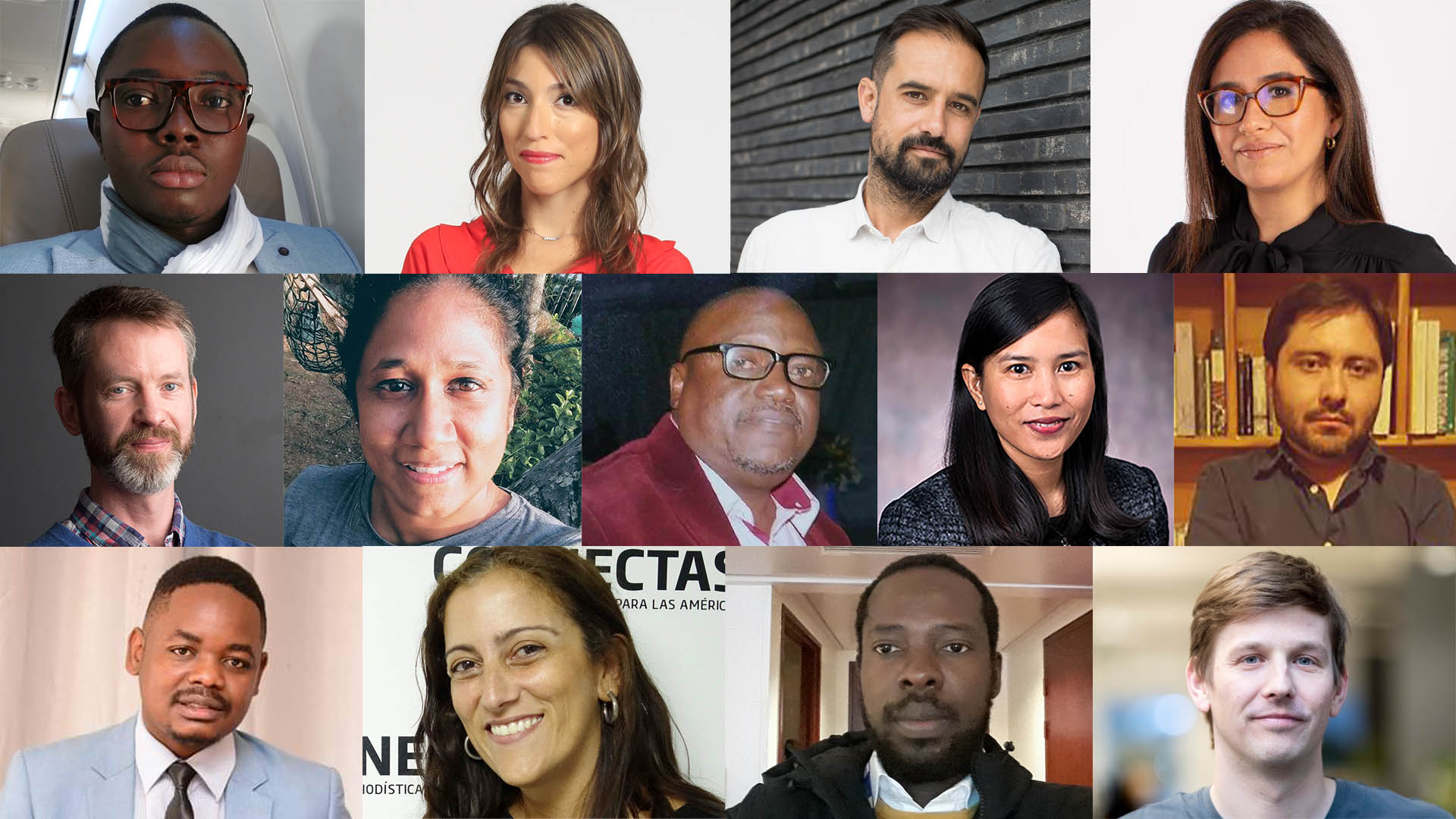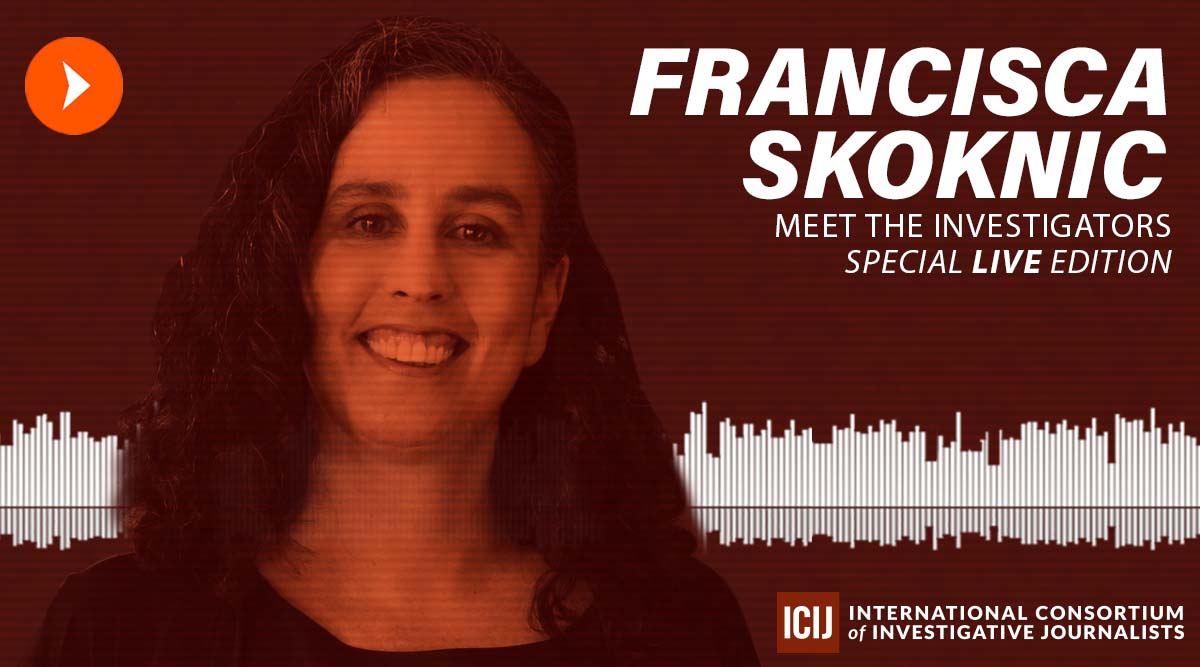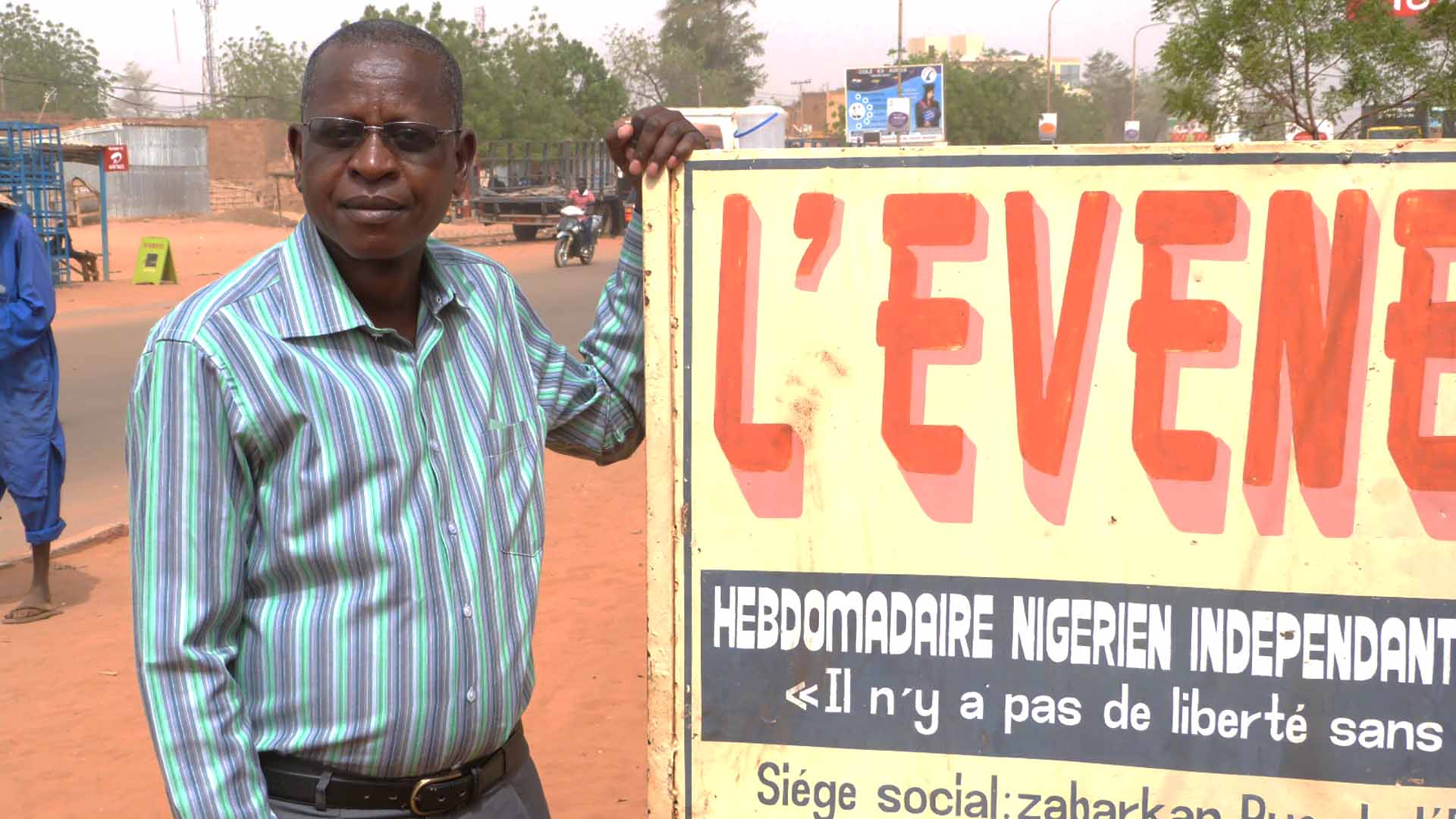MEET THE INVESTIGATORS
Keeping an ‘eye on the prize’ despite ongoing intimidation over FinCEN Files story
On the first anniversary of the publication of the FinCEN Files, we go behind the scenes with ICIJ member Moussa Aksar, whose reporting on a military procurement scheme in Niger uncovered one of the biggest corruption scandals in the country.
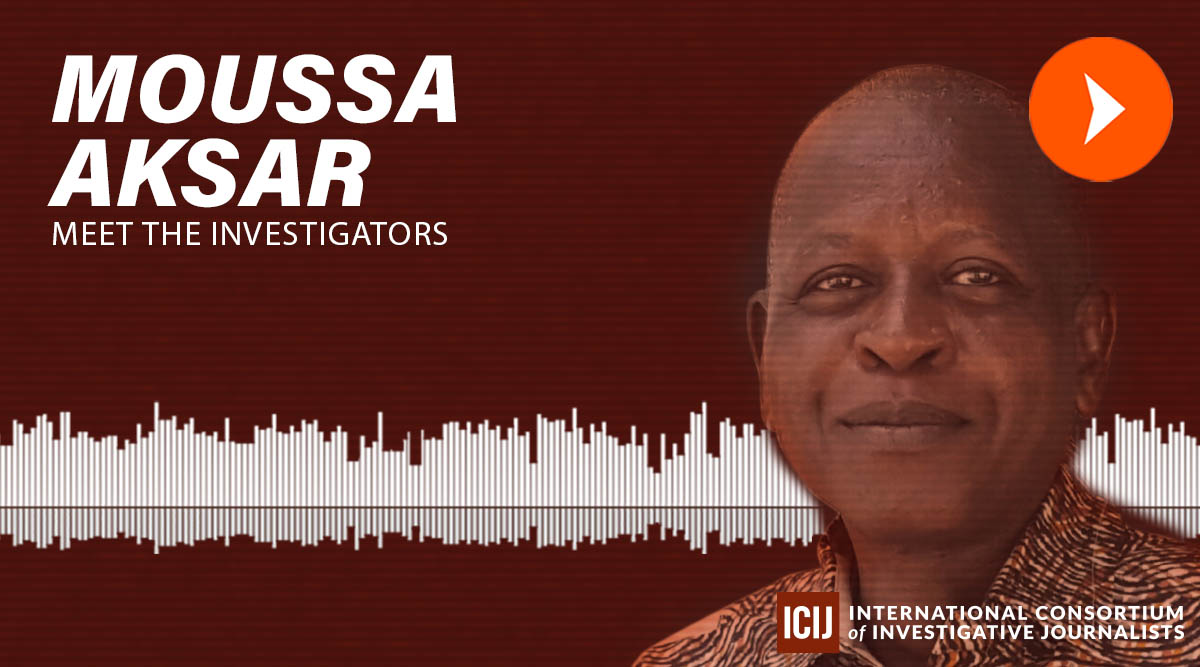
The International Consortium of Investigative Journalists collaborates with hundreds of members across the world. Each of these journalists is among the best in his or her country and many have won national and global awards. Our monthly series, Meet the Investigators, highlights the work of these tireless journalists.
On the first anniversary of the publication of the FinCEN Files, we checked in with one member of the reporting team who is still facing ongoing intimidation over his story. ICIJ member Moussa Aksar stole the headlines in Niger with an exposé on a military procurement scheme that saw millions of dollars disappear from government coffers into offshore accounts. It was one of the biggest stories Moussa had ever worked on, and one of the biggest corruption scandals to ever hit Niger, but, one year on, he is still facing down legal threats over his reporting. ICIJ’s regional coordinator Will Fitzgibbon spoke with Moussa about the challenges he faces as an investigative reporter in a country where democracy is still “under construction,” and about Moussa’s part in building a culture of accountability journalism in Niger and fostering a community of investigative reporters in West Africa who offer each other camaraderie and support.
ICIJ’s award-winning Meet the Investigators series is emailed exclusively to ICIJ’s Insiders each month before being published on ICIJ.org, and is one of a number of ways we like to thank our community of supporters who are so integral to our independent journalism. You can join our Insiders community by making a donation to ICIJ. Thanks to all our ICIJ Members who have shared their stories with us, and to all our supporters for helping ICIJ continue its work.
TRANSCRIPT
Sean McGoey: Welcome back to the Meet the Investigators podcast, from the International Consortium of Journalists. I’m your host, Sean McGoey, and I’m an editorial fellow here at ICIJ.
It’s been a year since ICIJ and BuzzFeed News published the FinCEN Files, an investigation into the role that global banks have played in the flow of illicit money worldwide. One of the most compelling stories that emerged from that project came from a newspaper in Niger called L’Evenement.
Its founder, Moussa Aksar, helped expose a procurement scandal in which millions of dollars mysteriously disappeared from the country’s defense budget and wound up in the coffers of offshore shell companies.
Moussa is a French speaker, but fortunately, so is Will Fitzgibbon, reporter extraordinaire and ICIJ’s partnership coordinator for Africa and the Middle East. Hey, Will. How are you?
Will Fitzgibbon: I’m well, Sean. How are you?
McGoey: I’m doing well. First things first, can you give a quick introduction to Moussa Aksar and why his story is so important in September of 2021?
Fitzgibbon: I think the fact that we’re doing this interview about Moussa in September, on the one-year anniversary of the FinCEN Files, is incredibly well-timed, because, as we’ll discuss a little bit later, Moussa’s FinCEN Files investigation, in his own words, was probably the biggest thing that he’s ever done. The FinCEN Files investigation helped Moussa Aksar expose important parts of one of the biggest corruption scandals that’s ever hit this impoverished West African country.
It’s such a small country [that] everyone knows investigative reporters like Moussa, and they’re considered troublemakers. And these are countries where troublemakers can be dealt with and threatened in much more serious ways than they can in the United States. Moussa knew this was a bombshell story. He knew that he would be personally in trouble as a result of publishing this story — and of course, now he’s being sued in court for defamation.
I’ve worked with him now for five or six years as a reporter at ICIJ. And Moussa is someone who, as soon as he enters a meeting of other West African, French-speaking reporters, you can feel and see the respect for him. This is someone who has gone to jail repeatedly for his reporting. This is someone who has been arrested and threatened repeatedly for his reporting. Someone who is no stranger to receiving death threats over the phone a few days after he publishes a story.
McGoey: You spoke to Moussa recently — can you tell us the story of how he found his way to a career in investigative journalism?
Fitzgibbon: I’ve chatted to Moussa about this a bunch. He’s such a colorful character in many ways. He comes from the northern desert region of Niger, a place called Agadez. Moussa grew up there as the child of a camel herder. And the way he tells it, he just always had a sense of justice. He dreamt of becoming a judge, until he realized that the judicial system in his country was crooked.
And then he started working in the radio. Until very quickly, he realized that there were certain stories that he was not allowed to tell by his bosses, because stories Moussa wanted to tell inevitably focused on companies or people in positions of power that the radio station didn’t want to upset. So faced with that, Moussa did what many journalists in that region do: He launched his own newspaper.
I’ve been to the offices of L’Evenement, and they’re doing much better now. But this is not glamour, you know. L’Evenement, in Niamey, Niger, is just a few small rooms, not many computers, fraying newspapers sitting around on the table. It’s a simple operation, but he’s succeeded in making it so that L’Evenement now has become a byword in his country for impact in investigative journalism.
The powerful people in Niger know that if they’re named on the front page of a L’Evenement story, then they’re in trouble — not necessarily in trouble from a legal perspective, because democracy there is still under construction, but in trouble in terms of their name, their story and their possible wrongdoing being out there.
McGoey: Will, you and I are both based in the US, and I think that can carry with it a certain set of assumptions on our part about investigative journalism — both how it’s practiced and how it’s received. But I’m really struck by that idea of a “democracy under construction.” What did Moussa mean by that, and how does it affect the way that he works as an investigative journalist?
Fitzgibbon: One of the most powerful lessons that I’ve learned working at ICIJ and collaborating with hundreds of journalists around the world is just how different life is as a reporter in different countries. I wake up every morning, [and] if I want, I can get myself a coffee. I open my computer, and I’m 99% sure that things are gonna work. That’s just not how investigative reporting works in so many countries around the world, including in Niger.
[Moussa] is a reporter who, when he first opened his newspaper, didn’t have a computer. This is someone who doesn’t have regular access to the internet at his office. And that, I think, continues into the daily practice of investigative reporting. You know, in Niger, you can’t just submit a Freedom of Information [Act] request. You can’t just call up the spokesman of the Minister of Justice and ask for an interview.
McGoey: Of course, none of that stops dogged reporters like Moussa from getting their stories. So what happens when those stories actually land?
Fitzgibbon: In the United States, in Europe [and] in other countries, the success of investigative journalism is often based on concrete results. Was Donald Trump impeached? Was Donald Trump investigated because of the tax story that The New York Times published, or did the Prime Minister of Iceland resign as a result of the Panama Papers? And what Moussa said to me in that interview I had with him was [that] you can’t apply those same objective standards of success or impact to countries where democracy just doesn’t function.
Let’s ask ourselves, why did the Prime Minister of Iceland resign after [the Panama Papers]?, Probably because Iceland has a bloody strong democracy, which means the pressure of local people actually has some weight. That’s just not how it works in countries like Niger or Nigeria or elsewhere. We’ve found at ICIJ, through painful experience, that you can have a politician bang to rights, you can have documents with the politician’s passport and signature that basically show [in] black and white [that] money was moved illicitly or illegally, and it doesn’t change a thing. And I think Moussa’s point was: Let’s measure success differently.
Prime ministers and presidents may not have resigned [in Niger]. But it’s still a success that investigative journalism, ICIJ and the FinCEN Files [are] known. If you speak to a vegetable seller, Moussa said, they’re going to be able to recognize the FinCEN Files in a way that Moussa said they wouldn’t even recognize the name of Joe Biden. And I think we as journalists should take a lot of solace and comfort in that kind of long-term, subconscious impact.
McGoey: This also brings to mind the ongoing situation with our Russian partners who were recently designated as foreign agents by the government. I feel like it must take a supernatural amount of resolve and courage to keep doing this work when the stakes are so high — when you know going in that it will likely result in significant adverse consequences for you.
Moussa exists, like so many investigative reporters, to tell those uncomfortable stories that are likely to have lasting impact in his country. And it’s an incredible testament to their courage that they continue to do so.
Fitzgibbon: Yeah, I think you just have to be so passionate about democracy and public interest, and that comes across very much in Moussa’s work. He knows he’s going to get a shellacking for every story that he publishes in partnership with ICIJ, and that’s actually what he wants. He’s not interested in doing stories about cats that get lost up trees. Moussa exists, like so many investigative reporters, to tell those uncomfortable stories that are likely to have lasting impact in his country. And it’s an incredible testament to their courage that they continue to do so.
Reporters in many of these countries are routinely offered much better salaries to stop being a reporter. They’re offered cars. They’re invited to go and work for the United Nations or a bank where they could earn five or 10 times what they earn as a reporter. But to their credit, in many of these cases, reporters don’t, and I think it speaks to their personal conviction — which, as Moussa says, really is the bedrock of investigative journalism.
McGoey: There’s an expression along these lines that Moussa used when he talked to you, and I’m going to lean on my illustrious high school French education in the hopes that I pronounce it correctly: pour que les puissants rendent gorge. Can you help explain what it means?
Fitzgibbon: I asked Moussa about that in our interview, because he says it all the time. If I could wear a T-shirt, it would have that phrase on it, pour que les puissants rendent gorge — which is really a colorful way of saying, as we would in Australia, “Let’s keep the bastards honest. Let’s hold powerful people accountable.”
And it’s what drives Moussa. It’s what drives so many of the reporters in the West African [and] Central African region who ICIJ work with all the time. That’s why these reporters continue to say yes to joining ICIJ projects. Anytime I call them up and say, “Guess what? ICIJ’s got another leak coming,” these reporters jump at the chance, because they know that holding the powerful accountable is why they do what they do.
McGoey: Earlier, you mentioned the idea of Moussa walking into a room of French-speaking West African reporters and commanding a certain level of respect. Can you talk a little more about the way that he acts as sort of an anchor to bring together similar-spirited journalists from around the region?
Fitzgibbon: I find it really touching, and quite rare, this West African family. For a number of years now, from Panama Papers [and] Paradise Papers — but especially [since] West Africa Leaks in 2018 — there’s a core team of about 15 or 20 West African reporters who believe themselves to be a part of this family. And what that means is they support each other journalistically, but also personally and financially, in a number of ways.
As many listeners might know, one of ICIJ’s new members from Benin, Ignace Soussou, was jailed for about six months, in part following some great investigations Ignace published related to the Panama Papers. And people like Moussa really took charge, in some ways, of supporting Ignace and his family, fundraising for Ignace’s wife and his children.
When Ignace came out [of jail], Moussa hosted Ignace at his goat and mango farm in Niamey, for example, just to make sure that the guy was alright. There’s this spirit of solidarity, companionship and professionalism among many of these French-speaking West Africans, because they know that they can’t do this alone.
You could count on one hand, I think, the number of investigative reporters of a similar ilk to Moussa or Ignace or Sandrine Sawadogo [an ICIJ member in Burkina Faso] — who we’ve spoken to on Meet the Investigators before — who share these values. And that value sharing is what keeps many of them motivated and pushes them to keep reporting on ICIJ projects, and outside ICIJ projects, too.
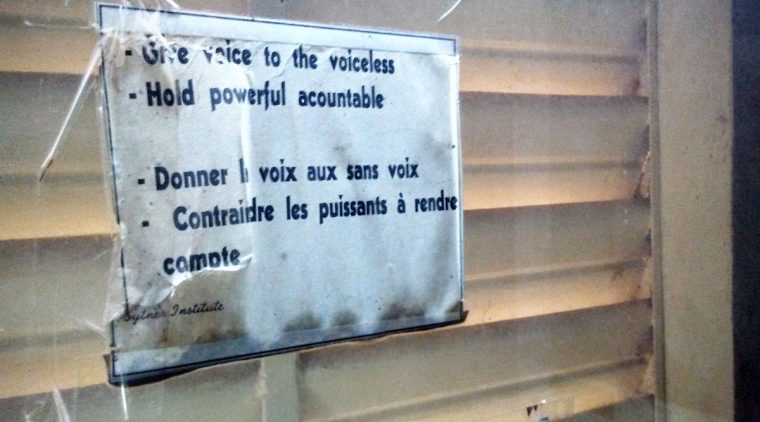
McGoey: What is the status of Moussa’s case today?
FItzgibbon: It’s a bit of a shemozzle [fiasco] in Niger, unsurprisingly. So the FinCEN Files investigation came out, and then pretty quickly after, one of the individuals mentioned in Moussa’s story filed a defamation case in Niger against Moussa. [He] has been called to appear before court two or three times now.
Nothing’s been adjudicated, nothing’s been discussed on its merits. But we know that in Niger, as Moussa says, the judicial system is not free. The President of the Republic of Niger has significant amounts of control over the judiciary, and guess whose name features in the investigation about the FinCEN Files that Moussa published? The president of Niger and his office.
So I think, as nonprofits like Reporters Without Borders and Committee to Protect Journalists have said publicly, this is a case that we all should be watching with alarm as an indication of the government of Niger’s respect — or not — of freedom of the press.
McGoey: What can we do — not just us as fellow investigative journalists, but people who think this work is important — what can we do to help support the mission that Moussa and the rest of the West African family is pursuing?
Fitzgibbon: There’s a bunch of stuff that all of us can do. I’m going to start with the obvious, which is money. You know, these newspapers don’t have money. Every time we work with these reporters on ICIJ projects, I spend a bunch of time scratching around, begging, trying to make pleas to organizations or friendly supporters who can offer $250 — because that kind of thing matters. But a simple message of support does a huge amount.
For someone like Moussa, who is often under pressure from authorities, messages of support that he receives from other journalists or from members of the public around the world saying “Hey, I’ve seen your story, I appreciate it. I’m thankful for your contribution to defending the public interest and holding the powerful accountable” — that kind of stuff really matters. If you’ve just come out of a seven-hour interrogation [by] the police in your country — you’re exhausted, you’re tired, all you want is a beer — getting notes like that can be, I think, really mentally valuable and stimulating.
Something that I’ve learned at ICIJ is [that] we as consumers of news in 2021 no longer have the excuse of just reading news from our countries. And we make a huge effort of that with ICIJ projects when we publish international roundups of impacts, so that you can have links to stories published in Niger or Nigeria or Namibia or Madagascar, for example. And I think if we really believe in democracy, public interest and investigative journalism around the world, taking five minutes to read one of those stories, then sending a note of thanks or support to the person who’s done that is incredibly powerful.
McGoey: To wrap up, is there any advice that Moussa imparted for people who have the same passion and drive to do investigative work?
Fitzgibbon: Moussa’s advice to me was don’t sweat the small stuff. If you’re passionate about investigative journalism, keep your eye on the prize. Keep working on those big stories that, even if nothing happens immediately, will be of ultimate benefit to your country.
Also, Moussa lives this, and I see it every time I meet him and work with him: Keep a low profile. Let’s be honest, journalism sometimes attracts people who love the limelight — people who love being on TV, love being on podcasts. Listeners can make their own judgments about what category I fall into! But Moussa is someone who really just keeps his head down and works. And I’ve seen him in action.
I’ve spent a week or two with him in Niger, and we toured the capital city, interviewing people. This is a discreet person, and that’s really his advice — in order to build sources, to engender trust in you as a ethical, reliable journalist, you’re going to need to go dark for a little while. And I think that is good advice, especially in countries where journalists are subject to harassment and to attack.
McGoey: Thank you very much, Will. We appreciate you being our conduit to Moussa, and I am sure we will hear from you again when there are more updates on his case.
Fitzgibbon: Thank you, Sean.
McGoey: That was my chat with Will Fitzgibbon, who coordinates ICIJ’s partnerships in Africa and the Middle East when he’s not reporting himself. Many thanks to Moussa Aksar and to all the journalists who share their stories here on the Meet the Investigators podcast.
We’d love to hear from you — don’t forget to use the hashtag #MeetTheInvestigators if you’re posting about this episode on social media, and drop us a line at social@icij.org if you have feedback.
Meet the Investigators is a production of the International Consortium of Investigative Journalists. This episode was hosted, produced and edited by me, Sean McGoey, with help from Hamish Boland-Rudder. If you’d like to support the work that ICIJ and partners like Moussa do, head to icij.org/donate or drop us a line via email.
Thanks for listening; we’ll talk to you again soon!
—
If you’re a fan of our Meet the Investigators series, please consider making a donation to support ICIJ. Not only will your donation help support our work with journalists like Moussa, but as an ICIJ Insider, you’ll also receive sneak previews, access to exclusive chats with reporters and behind-the-scenes content like this delivered straight to your inbox. Donate today, and support independent investigative journalism.

